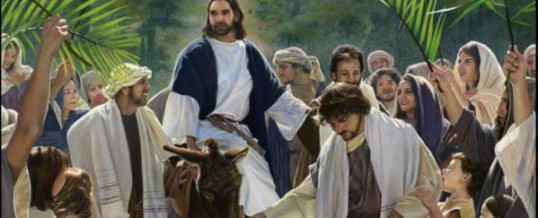
Today we celebrate Palm Sunday but what a strange celebration – no processions, no hosannas, not even palms. Our lives do take unexpected twists, twists that can throw us off balance, make life seem strange, put so many of the things we take for granted in a spin. On the other hand, the other name for this day seems to put things in a perspective that we can understand, Passion Sunday. Our world is enduring a kind of passion or suffering during these trying times, and as such it is an invitation for us to turn to prayer, to trust that God is with us in this suffering, that God’s strength and guidance will see us through just as the Father saw Jesus through his passion, death and burial; and then rewarded Jesus’ trust and faith with victory over death on Easter morning. So with confidence born of faith, we enter into this holiest of weeks, the week in which Jesus conquered death and gave us a share in the life of the Divinity.
It is a week of contrasts: of “hosannas” that turn to shouts of “crucify him”; of a joyful procession replaced by the via dolorosa; of waving palms replaced by spears and swords; of fellowship replaced by betrayal; and on and on. Why? Because as St. Paul says, Jesus did not regard equality with God as something to be exploited, but emptied himself. He turned his life over to humans to do with as they wished. Oh, on many occasions he had already taught and demonstrated what it was he willed for them and for us, what it was the Father willed for us through him, but in the end he left it humans to determine his fate. This week we memorialize humanity’s response and Jesus’ acceptance of it.
We know the story well: the triumphant entry into Jerusalem with people cheering, dancing, and singing, proclaiming Jesus as the Prophet from Nazareth in Galilee. If they saw him as the Messiah it was with a different focus than that of Jesus himself. While they expected and looked for a worldly deliverer, he makes it clear that his messiahship was to be very different. He came not as a conquering hero but as the king of peace: Look, your king is coming to you, humble, and mounted on a donkey. However, they saw only what they wanted to see. How often do we shape Jesus and his teachings to conform to what we want, not what he wants or what his message says?
As we follow the events in Matthew’s gospel, (take a look at the days as recounted in Matthew 21-25) Jesus will cleanse the temple (further increasing the anger and animosity of the religious authorities), he will be challenged by a whole host of people (the elders, Pharisees, scribes, Sadducees, Herodians), all trying to catch him in a mistake that they can then use to accuse him and hopefully discredit him and then be rid of him. However, he skillfully responds to their challenges, continues to call them to task for their unbelief and their self-centeredness, and teaches his disciples and the people in the temple (there were large numbers of people in town for the Passover celebrations) up to the day of the celebration of the Passover festival.
He celebrates the Passover, his Last Supper with his disciples, and retires to the garden where he is arrested, taken for trial (so-called), turned over to Pilate, tortured and sentenced to death, crucified and mocked even while dying on the cross, dies and is buried. That is the story in brief outline and throughout we witness St. Paul’s reason for saying that he emptied himself.
Nowhere in the whole story do we see Jesus say or do anything that serves himself. The humility and selflessness he displayed riding on the donkey is evident throughout. He knows that the authorities are out to destroy him, yet he continues his mission, teaching every day in the temple. When Judas betrays him, he does not become angry and berate Judas, but offers him a chance to repent. When he tells his disciples that they will desert him, he reassures them saying, after I am raised up, I will go ahead of you to Galilee. When he suffers anguish in the garden, he commits himself to doing his Father’s will. When arrested, he tells his disciples not to use violence to protect him (put your sword back into its place). When before the high priest, he tells the truth of his Sonship of the Father knowing it will cost him dearly. When before Pilate he makes no defense for himself but witnesses to truth. When mocked and derided, he remained silent. In all of this, nothing for himself, but all for his Father and those he loved, you and me. The king we celebrate today emptied himself totally for us. He died with absolutely nothing to his name except the cross on which he died; that and his absolute loyalty and trust in his Father.
So as we move on facing our challenges, and they are very real challenges, Jesus’ invitation is that we empty ourselves for others. So when we are inconvenienced by the restrictions on our movement, remember Jesus on the cross. When we would rather be gathering with our friends, remember Jesus deserted by all and unite your aloneness to his. When tempted to become frustrated, remember his restraint. And in the meantime, continue the Lenten practices of prayer, fasting and charity, offering them for those who suffer from the pandemic and entreat the healing power of Jesus on them, their loved ones and indeed the world. Pray for those who have succumbed to the virus and for their families. Pray, too for all those engaged in ministering to the victims of the virus, and all victims everywhere. We imitate Jesus best when we empty ourselves for others.
Fr. Charlie Broderick
APR
2020

About the Author: